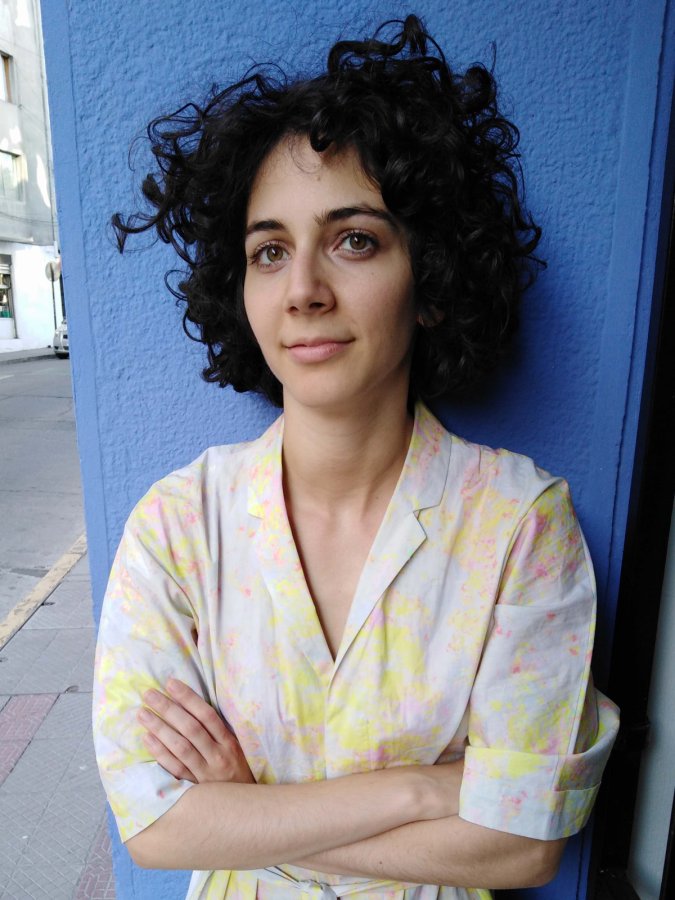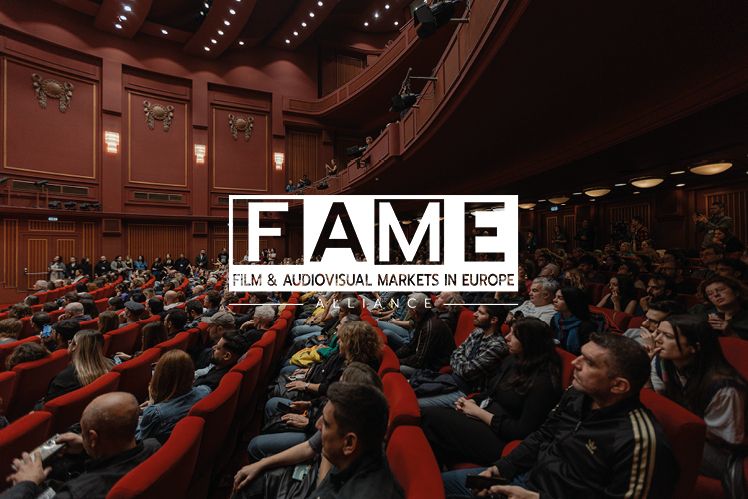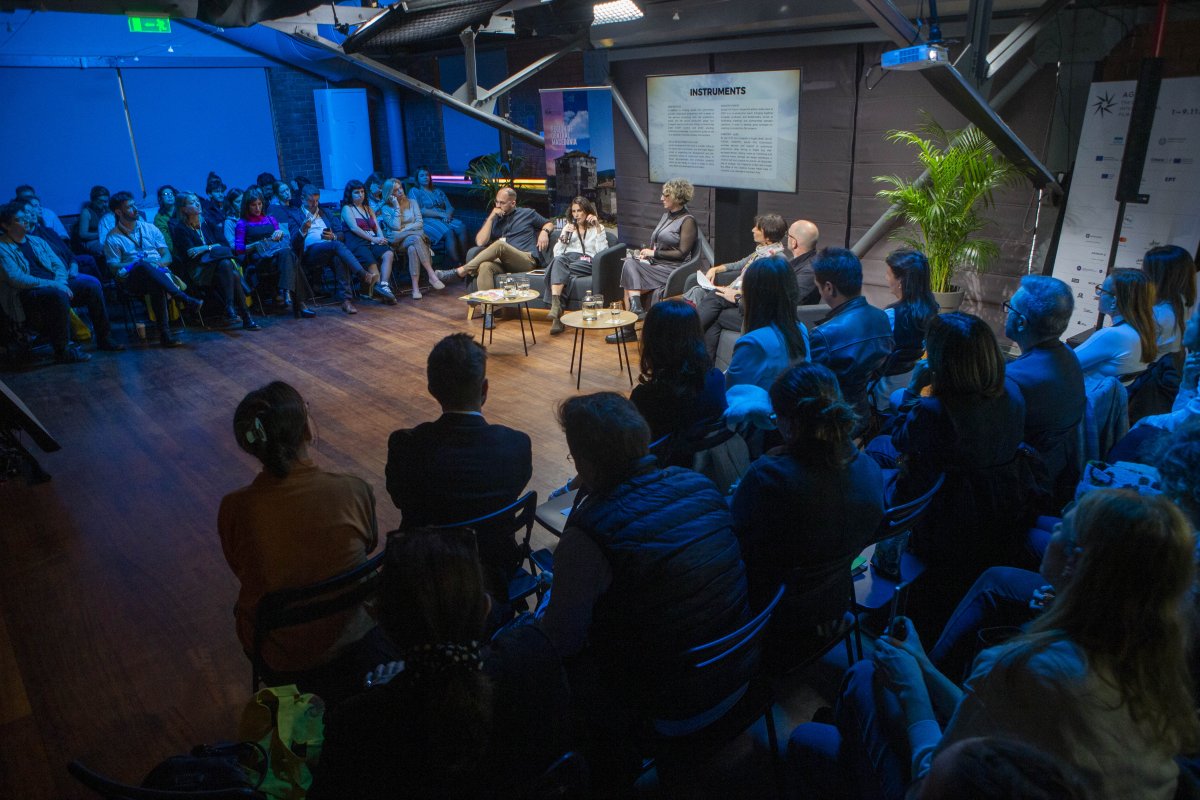21st THESSALONIKI DOCUMENTARY FESTIVAL [1-10/3/2019]
Documentary theater workshop: “From Film to Theater Documentary” Performance & discussion with the audience
An innovative workshop entitled “From Film to Theater Documentary” on refugee identity and experience took place as part of the 21st Thessaloniki Documentary Festival, organized by TDF in collaboration with the production company plays2place productions and the Greek Film Center. The workshop results were showcased as a work in progress on Friday 8 March 2019 at Pavlos Zannas theater.
The workshop -planned and carried out by theater director and social anthropologist Martha Bouziouri- was held on 2-8 March with the participation of 8 theater and cinema professionals (actors, drama school graduates, film directors, scriptwriters, playwrights), as well as researchers in social sciences, education and human rights disciplines. It is worth noting that this particular action took place for the first time in April 2018 at the Museum of Modern Art in Warsaw upon invitation by Biennale Warszawa.
“This project was very exciting both to prepare and to set up, it was full of energy and agitation”, TDF representative Thanos Stavropoulos noted as he opened the event.
Consequently, Martha Bouziouri thanked Thessaloniki Documentary Festival for the invitation and said: “The context we formed part of, the Documentary Festival, was appropriate for the play; however, what you are about to see is not a film, it is a theater documentary. In any case, we are using the same tools, the same practices, and talk about the same things. Our purpose was to make the participants pass through all the creative phases in the production stage of a theater documentary, simulating the professional preparation. Of course, what we do is not a regular show; it is a work in progress. What you will see on stage is material made exclusively by the participants. It is not a Chekhov play, for example, where there is a text to work with, just stories we wrote on paper. In other words, our work is deeply experiential and in part autobiographical. The participants delved into familiar places and themselves”.
It was a two-stage work. First, participants dealt with strengthening the team and exercising in theoretical exploration and study of the so-called documentary theater, analyzing different approaches and techniques. In addition, they studied the historical and cultural moment which determined the form and thematology of this particular theatrical genre. Later, they had to co-create their own original theater documentary by approaching artistically the refugee identity and experience by stating their own ideas and personal stories. This material, through creative reconstruction, became the show’s content in the form of a theatrical lectern / work in progress which was worked through intense rehearsals.
Consequently, the show was presented to the audience. The stories that participants chose to narrate on stage are purely experiential and include various situations and accounts dealing with the refugee issue. Some of the experiential stories they worked and presented by the team were about a ghost passenger in a trip from Thessaloniki to Belgrade, a refugee cat who had lived in Idomeni, a vlogger blending the secrets of a reality show with the story of refugee transitions, a Greek-Cypriot who discovers that a settler lives in his house at the Green Line, as well as a young girl who lives opposite a refugee-immigrant hotspot
After the show, Mrs Bouziouri and the participants’ team discussed with the audience. Asked about their experience in participating in the project, they all agreed that it was an unprecedented process, even for those who are familiar with theater. They became involved in a creative, yet complex condition which was formed gradually, but was presented on stage in a short time. “We didn’t have enough time, since we had to understand what theater documentary is and then build our stories, work on them and rehearse. Personally, I am proud not just of me, but of the whole team, since we managed to present a show and really shine”, one of the participants said. On her part, another participant noted that the project’s title was what drew her attention in the first place: “What we experienced was for me 100% real. I think film documentaries are very good, they have the eye and the camera, but what comes out in theater is totally real. We had to work on real stories born through a real theatrical process”.
On her part, Mrs Bouziouri said: “All this happened because we trusted one another and felt safe and warm enough to share such a sensitive material. In theater documentary it’s not obvious that we take from people their stories, considering that these stories are coming from us and it is us who materialize them. I want to say a big thank you to the team for devoting themselves to what we did”.
Asked whether studies or special preparation is needed to play in such a performance, the participants noted that “the most important elements in this process are the trust we built between us, and the guidance we received by our director”. They were also asked whether it is necessary in a documentary -even in theater- to make rehearsals, and if ethical issues came up regarding the material. “Rehearsals, since we are talking about theater, are necessary. As to ethical issues coming up, it is clear that our stories come from personal experiences, therefore the motives for each one of us depended on how they felt or how they imagine these stories. It is similar to recognizing ourselves, since we often see in there how we or people around us reacted to things. It is not a matter of ethics”, Mrs Bouziouri noted: “The most difficult part in this process is connecting to people and handle their stories in such a way that you ultimately feel OK with yourself”.
The workshop
General coordinator: Martha Bouziouri
Assistant: Paraskevi Lipimenou
Participants:
Valentina Michail
Rea Samaropoulou
Panagiotis Tsilingiris
Eva Oikonomou Vamvaka
Maya Lukic
Katerina Maya Andrianou
Konstantinos Mantsos
Haris Pagonidou















